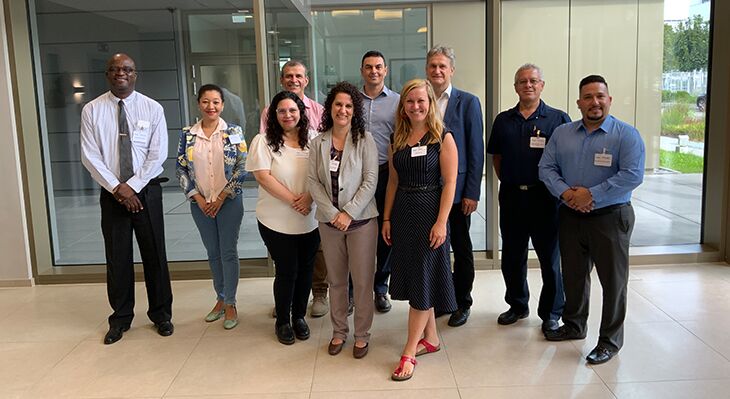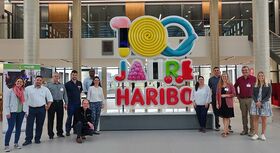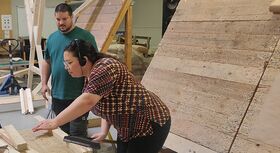Study visit from Costa Rica
08.09.2023
With the study visit of another group, the Instituto Nacional de Aprendizaje (INA) has underlined its interest in dual VET and is continuously strengthening its competences. Company visits and exchanges with other stakeholders such as chambers and vocational schools were the focus and led to versatile insights.

The Costa Rican Instituto Nacional de Aprendizaje (INA; Institute for Initial and Continuing Training) sent another group of staff from various regional directorates on a study visit to Germany during the week of 14-18 August. The aim was - as with the first group in December 2022 - to get to know Germany's dual vocational education and training system with its stakeholders and modes of operation in order to gain ideas and recommendations for the implementation of their own, Costa Rican dual TVET system.
To this end, GOVET organised an extensive programme of visits within the Cologne-Bonn region. The kick-off with basic information on Germany's dual system took place at GOVET, followed by a contribution from BIBB's regulatory department. Head of Department Dr. Monika Hackel and Thomas Felkl, research assistant, gave an impressive account of the existing procedures for the development of training regulations, in which experts from the social partners, i.e. from industry and employee representatives, specify the content. In addition to this aspect, the participants were particularly interested in the flexible design of the training regulations. The participants reported that the approach to the company-based part of training in Costa Rica still is too academic and that the companies are given too detailed specifications, by that limiting their scope of implementation.

The company visits also showed that flexibility in the company training regulations is a highly valued asset: Mr. Prokop, training manager at the company GKN Sinter in Bonn, emphasised that the company itself had to organise the training in order to be able to adapt it to the company's needs, but also to the learning progress of each and every trainee. The participants were surprised that in Germany it is currently difficult to recruit young people for training, while in Costa Rica the acquisition of companies for training participation the top priority at the moment. Ms. Passmann, head of training for the commercial professions at Haribo in Grafschaft, emphasized how important it is to closely accompany the trainees. With an extensive rotation plan, it was possible for the trainees to get to know as many areas of the company as possible during their training. This makes the training varied and modern, and it also facilitates integration into the company after the training. The management of H. J. Lohmar, a medium-sized company in the field of sanitary installations and electronics, also tries to offer modern training: the introductory days at the beginning of the training have a modern start-up atmosphere and they try to make the work assignments for young apprentices attractive and varied. However, it is becoming increasingly difficult to find committed trainees in both companies.

At further meetings, the INA representatives got to know the Cologne Chamber of Crafts (HWK) and the training campus in Cologne-Ossendorf. The participants were impressed by the multi-layered offer of the inter-company training centre and the range of craft professions, which, in the case of Costa Rica, are not organised in that way. During the visit to the Georg-Kerschensteiner Vocational College in Troisdorf, the participants met committed teachers and were guided through the premises and the diverse educational opportunities at the vocational college by the deputy headmaster, Mr. Sauer, and Ms. Lackmann, teacher for hairdressing professions. In an exchange with Mr. Pfaffe from iMOVE - Training made in Germany, it became clear that there are many commercially active companies in vocational education in addition to the public entities.
In the final workshop with GOVET and with the participation of Mr. Hochradel, advisor in the BMBF department for Erasmus+ and international vocational education and training cooperation, the participants drew a positive balance of their stay in Germany. Mr. Hochradel emphasised the importance of the exchange with Costa Rican colleagues within the framework of the BMBF's bilateral cooperation with Costa Rica.
The fruits that such a study visit can bear became clear during a visit to Costa Rica by Julia Olesen, project manager at GOVET: the participants of the first INA study trip in December 2022 presented the steps they had taken since then to implement dual VET: three participants have since started different dual VET programmes in their regions, which in turn have directly benefited around 40 trainees and 10 companies. The findings of the first study visit have also been incorporated into INA's 2023-2026 strategy for the implementation of dual VET in Costa Rica.